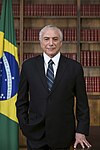
The International Monetary Fund (IMF) is a major financial agency of the United Nations, and an international financial institution funded by 190 member countries, with headquarters in Washington, D.C. It is regarded as the global lender of last resort to national governments, and a leading supporter of exchange-rate stability. Its stated mission is "working to foster global monetary cooperation, secure financial stability, facilitate international trade, promote high employment and sustainable economic growth, and reduce poverty around the world."

The Inter-American Development Bank is an international development finance institution headquartered in Washington, D.C., United States of America, and serving as the largest source of development financing for Latin America and the Caribbean. Established in 1959, the IDB supports Latin American and Caribbean economic development, social development and regional integration by lending to governments and government agencies, including State corporations.

Stanley Fischer is an Israeli-American economist who served as the 20th vice chair of the Federal Reserve from 2014 to 2017. Fischer previously served as the 8th governor of the Bank of Israel from 2005 to 2013. Born in Northern Rhodesia, he holds dual citizenship in Israel and the United States. He previously served as First Deputy Managing Director of the International Monetary Fund and as Chief Economist of the World Bank. On January 10, 2014, President Barack Obama nominated Fischer to the position of Vice Chair of the Federal Reserve. He is a senior advisor at BlackRock. On September 6, 2017, Stanley Fischer announced that he was resigning as Vice-Chair for personal reasons effective October 13, 2017, two days before his 74th birthday.

Henrique de Campos Meirelles is a Brazilian manager and former Minister of Finance and an executive of the Brazilian and the international financial sectors and former president of Central Bank of Brazil where he remained in office from 2003 to 2011. He chairs J&F's board of directors, company that owns Banco Original, JBS and Vigor, among others. He is also a member of the board of directors of Azul Brazilian Airlines.

Antoinette Monsio Sayeh is a Liberian economist and Deputy Managing Director of the International Monetary Fund (IMF). Sayeh served as the Director of the African Department at the IMF from July 14, 2008, to August 31, 2016. She also was a Distinguished Visiting Fellow at the Center for Global Development.
André Medici is a Brazilian health economist with a background in health strategy, public and private health financing in Latin America and the Caribbean, social security and pensions, economic reform, gender health issues, environmental protection, and globalization. He is currently a Senior Health Specialist at the Inter-American Development Bank, in Washington, DC.
Francisco Mayorga is a Nicaraguan economist and writer who specializes in international finance and economic development. For twenty years he taught managerial economics and corporate finance at INCAE, the leading Latin American graduate business school. In the eighties he served for five years in the board of directors of the Central American Bank (CABEI), the largest financial institution of the region. In the eighties, Mayorga also worked for the cause of peace in Central America, acting as Executive Secretary of the International Commission for Central American Recovery and Development.

Mauricio Claver-Carone is an American private-equity investor, former Treasury Department and National Security Council official, lawyer, and lobbyist, who was the president of the Inter-American Development Bank from October 2020 until September 26, 2022.

José De Gregorio Rebeco is a Chilean economist, academic, researcher, consultant and politician. He has been the Governor of the Central Bank of Chile, Minister of the Economy, Mining and Energy during the administration of Ricardo Lagos and is currently the Dean of the School of Economics and Business of the Universidad de Chile. He is also a nonresident Senior Fellow at the Peterson Institute for International Economics.

Kristalina Ivanova Georgieva-Kinova is a Bulgarian economist serving as the 12th managing director of the International Monetary Fund since 2019, and the first person from an emerging market economy to lead the institution. Born in Sofia, her university education was at London School of Economics (LSE), followed by a return to her native Bulgaria where she witnessed some of the economic hardships of the post-Communist transition. She began her career by teaching economics, becoming a prominent figure in the field.

Alexandre Antônio Tombini is a Brazilian economist. He was President of the Central Bank of Brazil until June 13, 2016, when he was replaced by Ilan Goldfajn. Since September 2019 he is Chief Representative for the Americas, based in Mexico City, of the Bank for International Settlements (BIS).
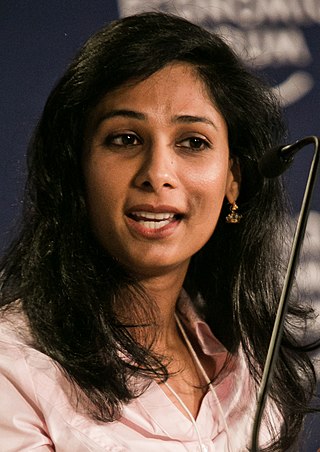
Gita Gopinath is an Indian-American economist who has served as the first deputy managing director of the International Monetary Fund (IMF), since 21 January 2022. She had previously served as chief economist of the IMF between 2019 and 2022.

Lin Jianhai is a Chinese economist and first-ever Secretary of the International Monetary Fund from China. He was appointed to this position in March 2012. During his IMF career, Lin worked across a wide range of country, policy, and administrative issues, including serving senior positions in the Secretary's, Finance, Policy Development and Review, and Asian and Pacific Departments. He currently manages the Secretary’s Department which is the operations arm of the Executive Board.

Joaquim Vieira Ferreira Levy is a Brazilian economist and Brazil's former Finance Minister. Levy took office on January 1, 2015, during the presidential inauguration of Dilma Rousseff's second term. He also was president of the Brazilian Development Bank (BNDES).

Mario Marcel Cullell is a Chilean economist who has been serving as Chile Minister of Finance since 11 March 2022. He previously served as Governor of the Central Bank of Chile. He was named Governor in December 2016 and member of the Bank's Board from October 2015. He has been a close collaborator to the governments of the centre-left Coalition of Parties for Democracy (1990–2010), and for six years held the position of Budget Director, where he played a key role in the design of the structural surplus rule.
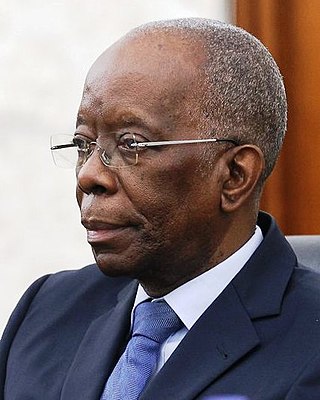
Adriano Afonso Maleiane is a Mozambican economist and politician who has served as the Prime Minister of Mozambique since 2022.

Geoffrey William Seiji Okamoto is an American economist and government official who served as first deputy managing director of the International Monetary Fund. Okamoto previously served as the acting assistant secretary for international finance and development in the United States Department of the Treasury. He was nominated for this position on January 1, 2019, by the White House and was never confirmed by the United States Congress. He previously served as acting assistant secretary for international markets and investment, for which he was also not confirmed.

Roberto de Oliveira Campos Neto is a Brazilian economist, former executive of Banco Santander, and current president of Central Bank of Brazil. He is the grandson of Brazilian politician Roberto Campos, who was minister of planning during the Brazilian military dictatorship.
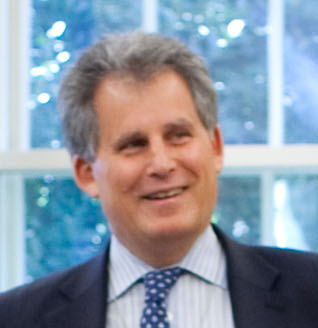
David Lipton is an American economist who served as the Acting Managing Director of the International Monetary Fund from July 2, 2019, following Christine Lagarde's nomination as President of the European Central Bank, until Kristalina Georgieva was appointed in the office on October 1, 2019. Prior to this, Lipton had been serving as the IMF's First Deputy Managing Director since September 2011. Lipton has been featured in, and interviewed by, numerous publications including The Financial Times, Euromoney, Bloomberg News, and The Guardian.
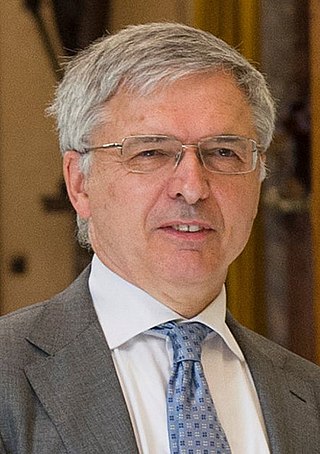
Daniele Franco is an Italian economist, central banker and civil servant who served as Minister of Economy and Finance in the cabinet of Prime Minister Mario Draghi from 2021 to 2022. From 2020 until 2021, he served as director-general of the Bank of Italy.




















